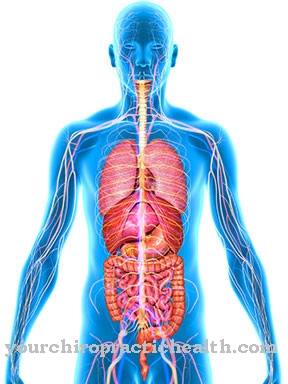Cystic fibrosis (cystic fibrosis) is a hereditary disease that is most common among white people. A typical sign of cystic fibrosis is the formation of thick mucus in the lungs and pancreas. As a result, the internal organs are severely impaired.
What is cystic fibrosis?

Cystic fibrosis (cystic fibrosis) is a metabolic disease that is mainly due to a genetic defect. It is now assumed that around 4 million Germans carry at least the gene that is responsible for inheritance. The symptoms are complex and difficult to recognize as they are often confused with other conditions such as asthma or bronchitis.
For example, those affected often suffer from pneumonia and shortness of breath. Disorders that affect growth and being underweight are typical symptoms of the disease. A few years ago the life expectancy of patients was a maximum of 5 years, but now children who have been diagnosed with cystic fibrosis can reach an average of 40 years.
causes
The cause of Cystic fibrosis lies in a genetic defect that is passed on. In order for the disease to break out, however, both parents must carry the defective gene and pass it on to the child. Since inheritance takes place in an autosomal recessive and non-dominant manner, a pair of parents in whom only one of them has the gene can have a perfectly healthy child. If both parents are affected, the likelihood that the child will develop the disease is one in four.
Since the defective gene can now be precisely localized, it is possible to determine whether the child will become ill or not before the child is born. Due to the defect, the membrane protein is put together incorrectly, so that the secretions are also influenced and take on a viscous consistency. This causes the cells to dry out and the salivary glands, sweat glands and the glands in the lungs to become clogged with the viscous fluid. If the defective gene has been inherited, the outbreak of cystic fibrosis can no longer be prevented.
Symptoms, ailments & signs
The symptoms of cystic fibrosis vary greatly from person to person and can affect several organ systems: Most of the time, the digestive tract and the respiratory tract are affected. Chronic cough with phlegm production, impaired digestion and the associated underweight are the most common signs of the disease. The first indication can already be very tough stool in newborns, occasionally this is accompanied by an intestinal obstruction.
As a result, severe flatulence, greasy diarrhea and vomiting with the presence of bile can occur. Small children have a big belly, but the extremities appear extremely thin. The children often suffer from abdominal pain, gain insufficient weight and have poor tolerance to fatty foods. At a young age, those affected often develop diabetes mellitus.
Due to the increased production of very viscous mucus in the lungs, there is a nocturnal irritable cough, which is similar to a whooping cough and leads to severe shortness of breath. The rattling breathing is noticeable, the children are often very restless. Due to the high susceptibility to infections, the chronic cough can repeatedly turn into bronchitis or pneumonia.
Occasional bleeding from the lungs, which can be seen by coughing up bloody mucus. The nasal mucous membrane tends to swell, sinus infections are not uncommon and make breathing difficult. Nasal polyps are also more common in children with cystic fibrosis.
Course of disease
Is the Cystic fibrosis Once it has broken out, symptoms arise, which are mainly due to the fact that the secretions of the person concerned are thickened and thus a viscous liquid is created. Problems therefore mainly arise in the lungs and in the pancreas.
Although the disease can now be treated due to medical advancement, the function of the organs is still restricted. Above all, patients complain of extremely uncomfortable shortness of breath, which can even lead to death by suffocation. The symptoms are getting harder and harder to endure, as cystic fibrosis costs those affected a lot of strength in the long run.
Complications
With cystic fibrosis, those affected suffer from coughing and severe shortness of breath. The shortness of breath can lead to dizziness or panic attacks and thus significantly reduce the patient's quality of life. The shortness of breath can also lead to a loss of consciousness, which can also injure the person concerned.
In addition, those affected experience diarrhea or flatulence and thus significant restrictions in everyday life. There is also pain in the abdomen. In the worst case, the breathing difficulties can still lead to patient death. As a rule, the patient's resilience also decreases, and fatigue and exhaustion develop. It is not uncommon for the permanent pain to lead to depressive moods and other psychological complaints.
Unfortunately, it is not possible to treat cystic fibrosis causally. However, the symptoms can be limited by eating the right diet and taking medication. It cannot be universally predicted whether cystic fibrosis will lead to a reduced life expectancy. In many cases, those affected are also dependent on laxatives.
When should you go to the doctor?
A doctor's visit is necessary if the person concerned suffers from symptoms such as coughing, severe gas or diarrhea. If there is repeated secretion of mucus when coughing, a check-up visit should be made to a doctor. Digestive disorders, loss of appetite and a decrease in body weight are signs of an existing irregularity that should be clarified by a doctor. If the person is severely underweight, the person concerned can develop an acute health condition without adequate medical care.
Children in particular belong to the risk group and are particularly at risk. Since the organism is undersupplied with nutrients, there is a need for action and supply in good time in severe cases. Constipations and intestinal obstruction should be examined and treated. A chronic cough, dry cough and a loss of normal performance are worrying.
If the person concerned suffers from an increased susceptibility to infection, diffuse bleeding or disorders of breathing, a doctor's visit is advisable. A doctor is required in the event of breathing noises, difficult breathing or shortness of breath. Anxiety, mood swings and behavioral problems should also be presented to a doctor as soon as they persist over a long period of time or increase in intensity. If there is general malaise or if the daily requirements can no longer be met as usual, the person concerned needs medical help.
Treatment & Therapy
It can be said that genetic research has not yet developed far enough Cystic fibrosis not heal yet. Nevertheless, there are ways of at least treating the symptoms and extending the life of those affected. There are many different medications that can help relieve some of the symptoms. However, diet is also important in treatment. Since the disease takes a lot of strength, high-calorie (high-calorie) food should be eaten, which gives the patient enough energy.
Another problem is that the enzymes from proteins and fats are not properly absorbed by the body, so these are best given in the form of supplements. Since many people with cystic fibrosis often suffer from digestive problems, lactulose, a laxative, can have a positive effect on the stomach and intestines.
Aftercare
With cystic fibrosis, there are usually no special or direct measures and options for follow-up care available to those affected, as this is a hereditary disease. For this reason, the patient should consult a doctor at the first signs and symptoms in order to prevent further complications and complaints from occurring.
If you want to have children, genetic testing and counseling should also be carried out so that the disease cannot recur in the descendants and children. Most people with cystic fibrosis depend on regular checkups and examinations by a doctor. Above all, the internal organs must be checked regularly in order to identify and treat damage at an early stage.
In general, the person concerned should pay attention to a healthy lifestyle, whereby a healthy diet is also very important. The doctor can help with creating a nutrition plan. The consumption of alcohol and cigarettes should be avoided. Medicines can also be taken for intestinal complaints, but always pay attention to the correct dosage. In most cases, the person affected with cystic fibrosis has no further follow-up measures available.
You can find your medication here
➔ Medication for shortness of breath and lung problemsOutlook & forecast
Due to the fact that the disease is caused by genetic changes, it is not curable. The life expectancy and quality of life of those affected are usually noticeably reduced. Without special therapy, the state of health deteriorates rapidly and those affected usually do not live long without treatment. However, it is possible to slow down the course of the disease considerably. With the help of consistent and timely therapy, patients now live significantly longer than they did a few years ago. The average life expectancy is currently around 40 - 50 years. However, many patients also live with the disease many years longer.
Even with intensive therapy, however, some complications can always occur. Most often, those affected suffer from acute shortness of breath due to poor lung ventilation.Individual parts of the lungs can also collapse. Chronic bronchitis or pneumonia are common. In addition, fungi can easily attack the lungs. In addition, a disturbed balance in the fluid and electrolyte balance can lead to shock and circulatory failure.
Furthermore, in some cases, reduced fertility in women and infertility in men can occur. Patients should seek genetic advice if they want to have children. A genetic test is made and it is checked whether the CFTR gene has any changes. Depending on this, it can be calculated how high the risk for the offspring is.
You can do that yourself
Strict adherence to the treatment plan prescribed by the doctor is extremely important in order to avoid complications of cystic fibrosis and to keep the quality of life stable over a long period of time. These include inhalations, regular physiotherapy exercises and individually tailored drug therapy.
In addition, diet plays an important role: A varied, high-calorie mixed diet is recommended, which can be enriched with healthy fats (e.g. vegetable oils) due to the increased energy requirement. In addition to the three main meals, cystic fibrosis patients should plan several snacks between meals. Basically everything that tastes good and stimulates the appetite is allowed. During meals, the patient must not forget to take digestive enzymes so that the nutrients can be absorbed by the organism.
Sports activities can also have a positive effect on the course of the disease. Endurance sports such as running, cycling, hiking, swimming and dancing are particularly suitable, and a visit to the fitness studio is also an option. Before starting any training, an individual training plan should be drawn up with the attending physician after a thorough examination, which takes physical performance and, in particular, lung capacity into account.
It is also important for cystic fibrosis patients to adhere to stricter hygiene rules in order to reduce the risk of pneumonia. Washing your hands thoroughly, changing your toothbrushes, bedding and towels regularly, and cleaning your inhaler carefully can all help.

.jpg)



.jpg)
.jpg)

















.jpg)



